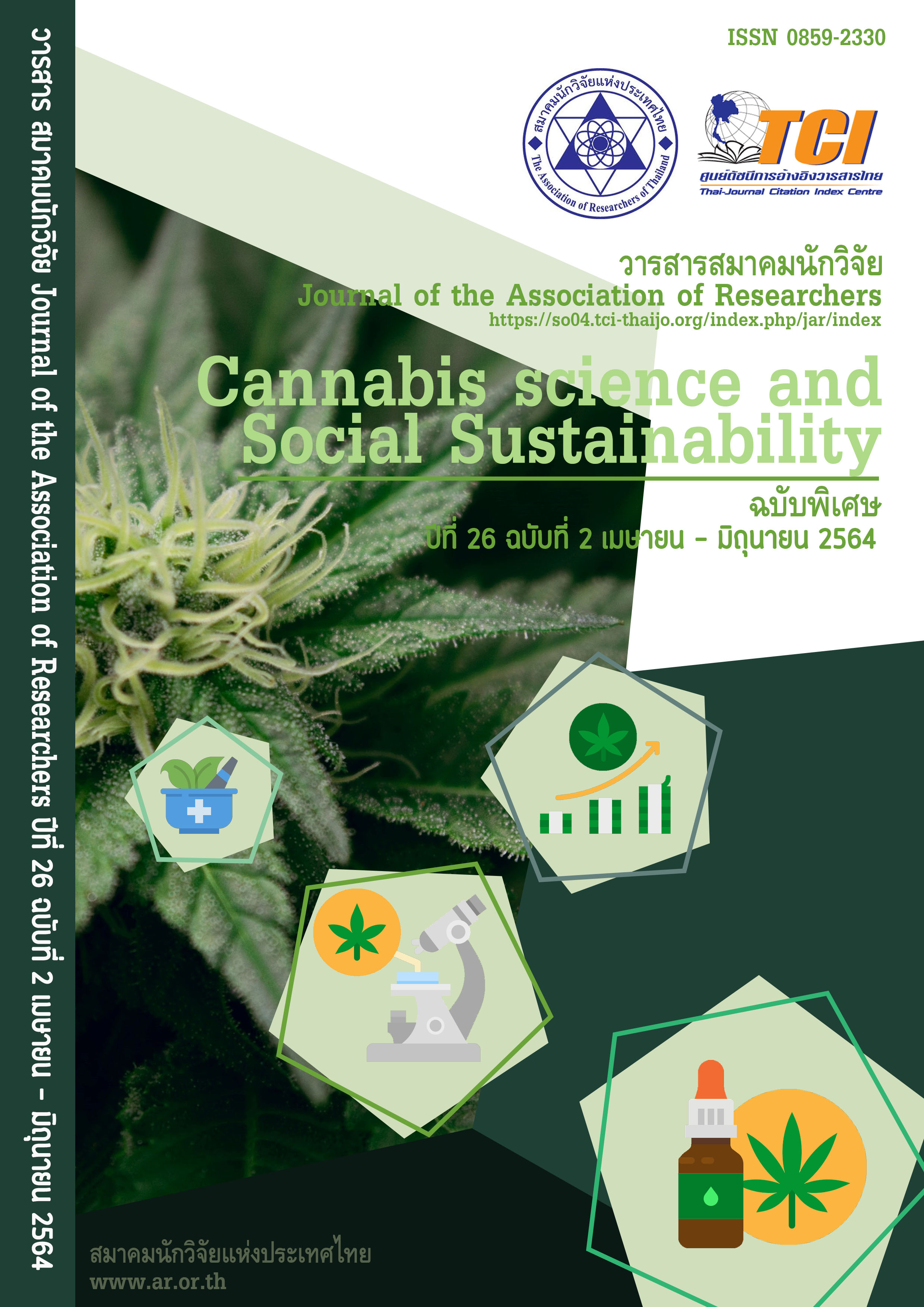ความรู้ ทัศนคติ และการปฏิบัติต่อการใช้กัญชาของประชากรในเขตภาคใต้
Main Article Content
บทคัดย่อ
การวิจัยครั้งนี้เป็นการวิจัยเชิงปริมาณ มีวัตถุประสงค์เพื่อศึกษา 1) ความสัมพันธ์ระหว่างปัจจัยประชากรศาสตร์และพฤติกรรมการใช้กัญชาของประชากรในเขตภาคใต้ 2) ความรู้เกี่ยวกับกัญชาที่แตกต่างกันส่งผลต่อทัศนคติต่อการใช้กัญชาของประชากรในเขตภาคใต้ 3) ความรู้เกี่ยวกับกัญชาที่แตกต่างกันส่งผลต่อการปฏิบัติที่มีต่อการใช้กัญชาของประชากรในเขตภาคใต้ และ 4) ความสัมพันธ์ระหว่างทัศนคติต่อการใช้กัญชาและการปฏิบัติที่มีต่อการใช้กัญชาของประชากรในเขตภาคใต้ ข้อมูลปฐมภูมิได้จากการเก็บแบบสอบถามจากกลุ่มตัวอย่างที่เป็นประชากรในเขตภาคใต้ จำนวน 400 คน วิเคราะห์ข้อมูลทางสถิติด้วยการแจกแจงความถี่ ร้อยละ ค่าเฉลี่ย ส่วนเบี่ยงเบนมาตรฐาน และทดสอบสมมติฐานด้วยค่าสถิติไคสแควร์ การวิเคราะห์ความแปรปรวนทางเดียว เปรียบเทียบรายคู่ LSD และการวิเคราะห์สมการถดถอยเชิงพหุคูณ โดยกำหนดระดับนัยสำคัญทางสถิติที่ 0.05
ผลการวิจัยพบว่า ปัจจัยประชากรศาสตร์ด้านรายได้เฉลี่ยต่อเดือนมีความสัมพันธ์กับพฤติกรรมการใช้กัญชา ระดับความรู้เกี่ยวกับกัญชาที่ต่างกัน ส่งผลต่อทัศนคติการใช้กัญชาด้านการแพทย์ ด้านกฎหมาย ด้านเศรษฐกิจ และภาพรวม ระดับความรู้เกี่ยวกับกัญชาที่ต่างกัน ส่งผลต่อการปฏิบัติที่มีต่อการใช้กัญชาด้านการรักษา ด้านสันทนาการ ด้านการบริโภค และภาพรวม และทัศนคติต่อการใช้กัญชาด้านกฎหมาย ด้านเศรษฐกิจ ด้านสังคมและอื่นๆ ส่งผลต่อการปฏิบัติที่มีต่อการใช้กัญชาของประชากรในเขตภาคใต้ อย่างมีนัยสำคัญทางสถิติที่ระดับ 0.05
Article Details

อนุญาตภายใต้เงื่อนไข Creative Commons Attribution-NonCommercial-NoDerivatives 4.0 International License.
บทความที่ปรากฏในวารสารนี้ เป็นความรับผิดชอบของผู้เขียน ซึ่งสมาคมนักวิจัยไม่จำเป็นต้องเห็นด้วยเสมอไป การนำเสนอผลงานวิจัยและบทความในวารสารนี้ไปเผยแพร่สามารถกระทำได้ โดยระบุแหล่งอ้างอิงจาก "วารสารสมาคมนักวิจัย"
เอกสารอ้างอิง
กรพินทุ์ ปานวิเชียร. (2563). ปัจจัยที่มีความสัมพันธ์กับระดับพฤติกรรมการใช้กัญชาเพื่อประโยชน์ทางการแพทย์. The Journal of Boromarjonani College of Nursing Suphanburi, 3 (1): 31-42.
กัญชาทางการแพทย์. (2562). 33 ประเทศที่อนุญาตให้มีการใช้กัญชาทางการแพทย์ ประเทศไหนเสพกัญชาได้ไม่ผิดกฏหมาย. สืบค้นจาก https://www.กัญชาทาง การ แพทย์.com/2019 /04/legality-of-cannabis-for -medical-and-recreational.html.
ผกาทิพย์ รื่นระเริงศักดิ์. (2562). กัญชากับการรักษาโรค. สืบค้นจาก https://pharmacy.mahidol.ac.th/th/knowledge/article/453/กัญชา/.
มานพ คณะโต. (2562). กัญชา. เครือข่ายพัฒนาวิชาการและข้อมูลสารเสพติดภาคตะวันออก เฉียงเหนือ คณะแพทย์ศาสตร์ มหาวิทยาลัยขอนแก่น.
วรวรรณ ทองสุข. (2563). กัญชากับการศึกษาเกษตร. วารสารครุศาสตร์อุตสาหกรรม สถาบันเทคโนโลยีพระจอมเกล้าเจ้าคุณทหารลาดกระบัง, 19(1), 144-154.
สำนักงานคณะกรรมการป้องกันและปราบปรามยาเสพติด กระทรวงยุติธรรม. (2562). ผลการปราบปรามยาเสพติดทั่วประเทศรายงานประจำปี 2562. สืบค้นจากhttps://www. oncb.go.th/DocLib/202562
สำนักงานประชาสัมพันธ์จังหวัดพัทลุง. (2563). ติดตามโครงการปลูกกัญชาเพื่อประโยชน์ทางการแพทย์ จังหวัดพัทลุง. สืบค้นhttps://thainews prd.go.th/th/news/detail/TCATG200630105729314.
สำนักงานสถิติแห่งชาติ. (2563). จำนวนประชากรจากการทะเบียน จำแนกตามอายุ เพศ และจังหวัด พ.ศ. 2562. สืบค้นจาก http:// statbbi.nso.go.th/staticreport/page/sector/th/01.aspx.
Bloom, B. S .1(964). Taxonomy of education objective: The classification of education -nal goals: Handbook II: Affective domain. New York: David Mckay.
Gazibara, T., M. Prpic, G. Maric, T. Pekmezovic, & D. Kisic-Tepavcevic. (2017). Medical cannabis in Serbia: The survey of knowledge and attitudes in an urban adult population. Journal of psychoactive drugs, 49 (3): 217-224.
Schiffman, L. G., & Kanuk, L. L. (2007). Consumer behavior: Its origins and strategic Applications. Consumer Behavior. 9th ed. Upper Saddle River: Pearson Education.
Solomon, M., Bamossy, G. J., Askegaard, S., & Hogg, M. K. (2006). Consumer Behaviour: A European Perspective. 3rd ed. London: Prentice Hall.
Yamane, T. (1967). Statistics: An Introductory Analysis. 2nd ed. New York: Harper and Row.
Translated Thai References
Korapin Phanvichian. (2020). Factors Associated with Cannabis Usage on Behavioral Level for Medical Benefits of the people. The Journal of Boromarjonani College of Nursing Suphanburi, 3 (1): 31-42. (in Thai)
Manop Kanato. (2019). Cannabis. Khon Kaen University.
Medcannabis. (2019). 33 countries allow medical cannabis use Which country is not illegal to use cannabis?. Retrieved from https://www.กัญชาทางการแพทย์.com/2019 /04/legality-of-cannabis-for-medical-and-recreational.html. (in Thai)
National Statistical Office. (2020). Number of population from registration by age, sex and province, 2019. Retrieved fromhttp://statbbi.nso.go. th/staticreport/page/sector/th/01.aspx. (in Thai)
Office of the Narcotics Control Board. (2019). Nationwide drug crackdown results 2019 annual report. Retrieved from https://www.oncb.go.th/DocLib/202562. (in Thai)
Pakatip Ruenraroengsak. (2019). cannabis and the treatment of disease. Retrieved from https://pharmacy.mahidol.ac.th/th/knowledge/article/453/กัญชา/. (in Thai)
Phatthalung Provincial Public Relation Office. (2021). Follow up on a project to grow marijuana for medical purposes. Phatthalung Province. Retrieved from https://thainews.prd.go.th/th/news/detail/TCATG200630105729314. (in Thai)
Worawan Thongsuk. (2020). Cannabis and agricultural education. Journal of Industrial Education, 19(1), 144-154. (in Thai)

